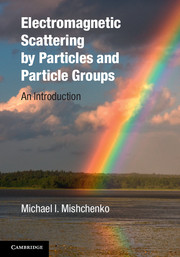Book contents
- Frontmatter
- Dedication
- Contents
- Preface
- Acknowledgments
- Acronyms
- 1 Introduction
- 2 The macroscopic Maxwell equations and monochromatic fields
- 3 Fundamental homogeneous-medium solutions of the macroscopic Maxwell equations
- 4 Basic theory of frequency-domain electromagnetic scattering by a fixed finite object
- 5 Far-field scattering
- 6 The Foldy equations
- 7 The Stokes parameters
- 8 Poynting–Stokes tensor
- 9 Polychromatic electromagnetic fields
- 10 Polychromatic scattering by fixed and randomly changing objects
- 11 Measurement of electromagnetic energy flow
- 12 Measurement of the Stokes parameters
- 13 Description of far-field scattering in terms of actual optical observables
- 14 Electromagnetic scattering by a small random group of sparsely distributed particles
- 15 Statistically isotropic and mirror-symmetric random particles
- 16 Numerical computations and laboratory measurements of electromagnetic scattering
- 17 Far-field observables: qualitative and quantitative traits
- 18 Electromagnetic scattering by discrete random media: far field
- 19 Near-field scattering by a sparse discrete random medium: microphysical radiative transfer theory
- 20 Radiative transfer in plane-parallel particulate media
- 21 Weak localization
- 22 Epilogue
- Appendix A Dyads and dyadics
- Appendix B Free-space dyadic Green's function
- Appendix C Euler rotation angles
- Appendix D Spherical-wave decomposition of a plane wave in the far zone
- Appendix E Integration quadrature formulas
- Appendix F Wigner d-functions
- Appendix G Stationary phase evaluation of a double integral
- Appendix H Hints and answers to selected problems
- References
- Index
- Plate Section
6 - The Foldy equations
Published online by Cambridge University Press: 05 July 2014
- Frontmatter
- Dedication
- Contents
- Preface
- Acknowledgments
- Acronyms
- 1 Introduction
- 2 The macroscopic Maxwell equations and monochromatic fields
- 3 Fundamental homogeneous-medium solutions of the macroscopic Maxwell equations
- 4 Basic theory of frequency-domain electromagnetic scattering by a fixed finite object
- 5 Far-field scattering
- 6 The Foldy equations
- 7 The Stokes parameters
- 8 Poynting–Stokes tensor
- 9 Polychromatic electromagnetic fields
- 10 Polychromatic scattering by fixed and randomly changing objects
- 11 Measurement of electromagnetic energy flow
- 12 Measurement of the Stokes parameters
- 13 Description of far-field scattering in terms of actual optical observables
- 14 Electromagnetic scattering by a small random group of sparsely distributed particles
- 15 Statistically isotropic and mirror-symmetric random particles
- 16 Numerical computations and laboratory measurements of electromagnetic scattering
- 17 Far-field observables: qualitative and quantitative traits
- 18 Electromagnetic scattering by discrete random media: far field
- 19 Near-field scattering by a sparse discrete random medium: microphysical radiative transfer theory
- 20 Radiative transfer in plane-parallel particulate media
- 21 Weak localization
- 22 Epilogue
- Appendix A Dyads and dyadics
- Appendix B Free-space dyadic Green's function
- Appendix C Euler rotation angles
- Appendix D Spherical-wave decomposition of a plane wave in the far zone
- Appendix E Integration quadrature formulas
- Appendix F Wigner d-functions
- Appendix G Stationary phase evaluation of a double integral
- Appendix H Hints and answers to selected problems
- References
- Index
- Plate Section
Summary
The formalism described in Chapters 4 and 5 applies equally to a scatterer in the form of a single body and to a fixed multi-particle group. However, when the scattering object is a cluster consisting of touching and/or separated distinct components, then it is often convenient to use a modified formalism in which the total scattered field is explicitly represented as a vector superposition of the partial fields contributed by the cluster components. This approach is based on the system of integral so-called Foldy equations (FEs) which follow directly from the MMEs, automatically incorporate all boundary conditions and the radiation condition at infinity, and rigorously describe the scattered electric field at any point in space. In this chapter, we will derive both the exact form of the FEs and an approximate far-field version. The latter applies to a group of widely separated particles and offers significant simplifications essential for the development of microphysical theories of radiative transfer and WL.
Vector form of the Foldy equations
Consider electromagnetic scattering by a fixed group of N finite particles collectively occupying the interior region VINT, according to Eq. (4.1). As before, we assume that the particles are imbedded in an infinite, homogeneous, linear, isotropic, and nonabsorbing medium.
Information
- Type
- Chapter
- Information
- Electromagnetic Scattering by Particles and Particle GroupsAn Introduction, pp. 62 - 71Publisher: Cambridge University PressPrint publication year: 2014
